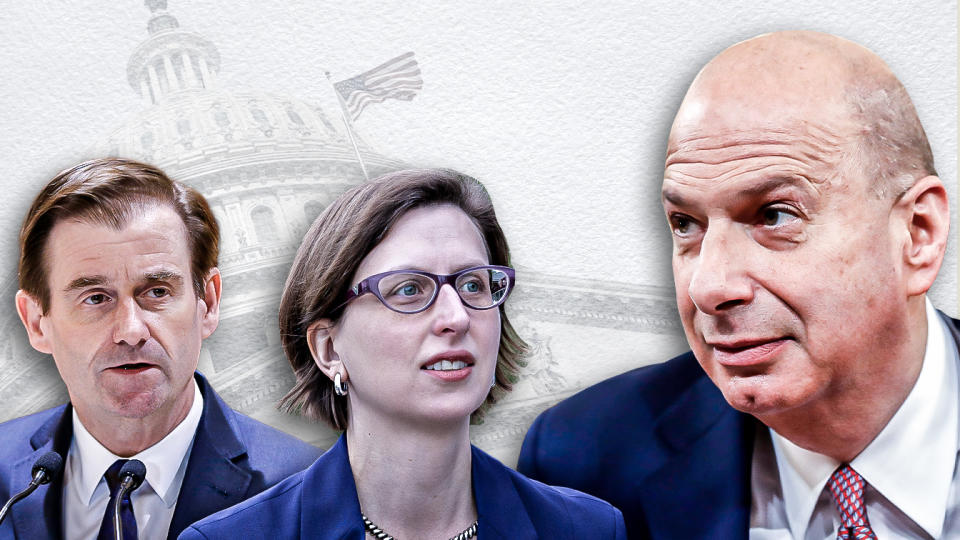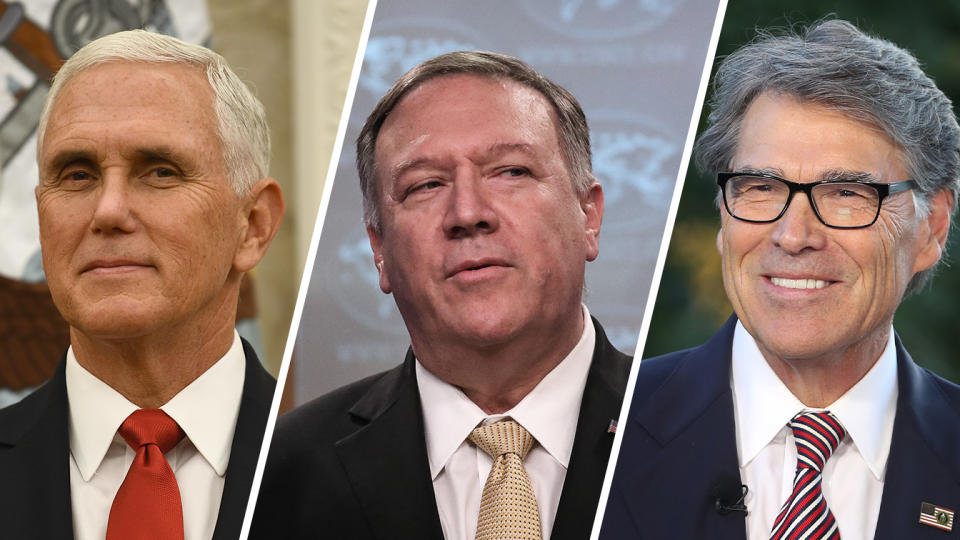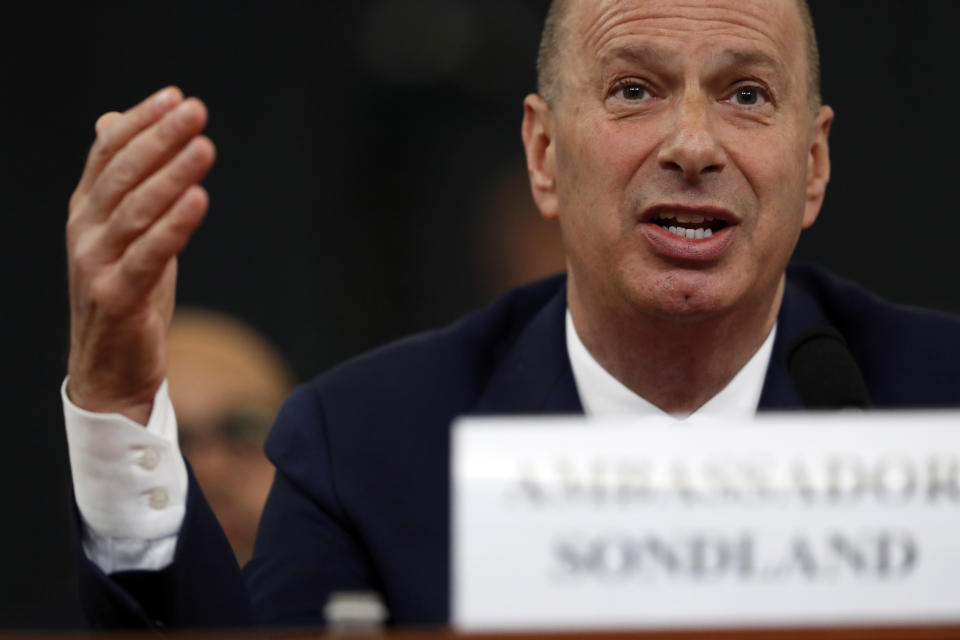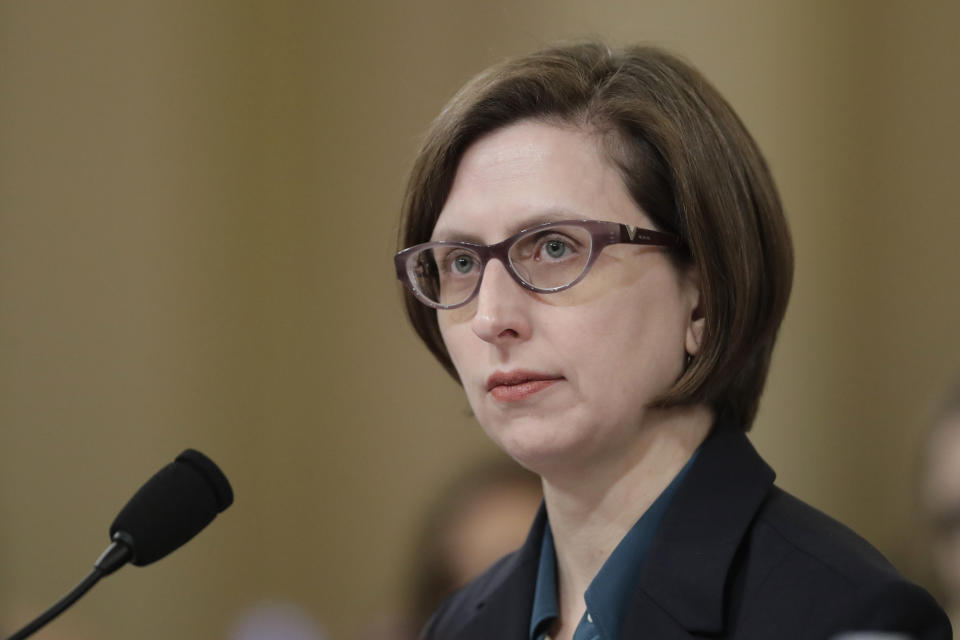Trump impeachment: 4 takeaways from Sondland's testimony and Day 4 hearings
The fourth day of public testimony in the impeachment inquiry contained perhaps the worst news yet for President Trump, as Gordon Sondland, U.S. ambassador to the European Union, said that the president himself was behind the push to get Ukraine to investigate former Vice President Joe Biden in exchange for a White House visit — and that a number of key administration officials understood that.
In a second session, a Defense Department official disclosed that Ukraine communicated its concern about the withheld military assistance as early as July, contradicting a key administration talking point: that Trump could not have used the aid as leverage if the government in Kyiv didn’t realize it was being held back.
Here are key moments from Wednesday’s hearings.
‘Express direction of the president’

Former New York City Mayor and Trump personal attorney Rudy Giuliani figured prominently in Sondland’s testimony. The ambassador, who was appointed to his position after donating $1 million to Trump’s inauguration, said the president told him to “talk to Rudy” about how to deal with newly elected Ukrainian President Volodymyr Zelensky. Sondland said he understood that Zelensky’s desire for a White House meeting would be used as leverage in exchange for an announcement that Ukraine would investigate Biden and his son Hunter. Additionally, the White House put a hold on nearly $400 million in military aid that had been set to go to Ukraine.
“Was there a ‘quid pro quo’?” said Sondland in his opening statement to the House Intelligence Committee. “The answer is yes.”
While Sondland testified that Trump never directly instructed him that an investigation was a precondition for the White House meeting, he understood that Giuliani was making the demand at the “express direction of the president.”
“Giuliani’s requests were a quid pro quo for arranging a White House visit for President Zelensky,” said Sondland. “Mr. Giuliani demanded that Ukraine make a public statement announcing investigations of the 2016 election/DNC server and Burisma. Mr. Giuliani was expressing the desires of the president of the United States, and we knew that these investigations were important to the president.”
The “DNC server” mentioned by Sondland is the nonexistent basis for a right-wing conspiracy theory meant to prove Russia did not interfere in the 2016 election. Burisma is the Ukrainian gas company at the heart of another Trump obsession: Biden’s negotiations with Ukraine as vice president. Hunter Biden was appointed to Burisma’s board of directors. An ongoing theme of the investigation so far is the belated realization, by Sondland and one of the key witnesses Tuesday, special envoy Kurt Volker, that the mention of Burisma was shorthand for a smear against Biden.
“We weren’t happy with the president’s directive to talk with Rudy. We did not want to involve Mr. Giuliani,” said Sondland, adding, “Simply put, we played the hand we were dealt. We all understood that if we refused to work with Mr. Giuliani, we would lose an important opportunity to cement relations between the United States and Ukraine. So we followed the president’s orders.”
Giuliani disputed Sondland’s testimony on Twitter.
‘Everyone was in the loop’

Sondland also said that Vice President Mike Pence, Secretary of State Mike Pompeo and Energy Secretary Rick Perry were aware of the pressure on Ukraine to investigate the Bidens.
“Everyone was in the loop,” said Sondland. “It was no secret. Everyone was informed via email on July 19, days before the presidential call.”
“As I communicated to the team,” said Sondland, “I told President Zelensky in advance that assurances to ‘run a fully transparent investigation’ and ‘turn over every stone’ were necessary in his call with President Trump.”
Among those on the “team” were Perry, Pompeo and acting White House chief of staff Mick Mulvaney. Mulvaney is also the director of the Office of Management and Budget, which several witnesses have said implemented the hold on aid to Ukraine in the face of resistance from the national security community. Sondland testified that Perry volunteered to call Giuliani, on Trump’s instructions. Pompeo told Sondland, according to emails that were part of his testimony, “You’re doing great work [on pressuring Ukraine]; keep banging away.”
Sondland said he had reservations about the administration’s strategy, which he mentioned to Pence before he met with Zelensky in Warsaw on Sept. 1.
“I mentioned to Vice President Pence before the meetings with the Ukrainians that I had concerns that the delay in aid had become tied to the issue of investigations,” said Sondland. He said Pence “nodded that he heard what I said.”
Pence, Perry and Pompeo all denied Sondland’s sworn testimony in statements from their respective spokespeople. None has testified in the probe.
‘It was absolutely a requirement’

Under questioning from Democratic counsel Daniel Goldman, Sondland said that Zelensky’s announcement of the investigation was the main objective of the White House. Actually conducting an investigation wasn’t a priority for Trump, implying that the White House’s stated concerns about “corruption” were just a pretext to embarrass Biden, who is running for president.
“I never heard, Mr. Goldman, anyone say that the investigations had to start or had to be completed,” said Sondland. “The only thing I heard from Mr. Giuliani or otherwise was that they had to be announced in some form, and that form kept changing.”
According to testimony last week from diplomat Bill Taylor, Zelensky had initially agreed to do an interview on CNN where he would discuss Burisma and the 2016 election. After pressing from Rep. Sean Patrick Maloney, D-N.Y., Sondland admitted that an investigation into Biden would benefit Trump.
Sondland’s account corroborated Taylor’s testimony that Sondland had said that “everything,” including both the White House meeting and military aid, was dependent on Zelensky’s announcement.
“My fear at the time was that since Ambassador Sondland had told me President Zelensky already agreed to do a CNN interview, President Zelensky would make a statement regarding ‘investigations’ that would have played into domestic U.S. politics,” said Taylor.
When asked by Rep. Mike Turner, R-Ohio, about testimony by Kurt Volker, the former special envoy to Ukraine, that an investigation was not a requirement for Zelensky to get a White House meeting, Sondland disagreed.
“I strongly disagree with that portion of his testimony,” said Sondland. “It was absolutely a requirement, or we would have just had the meeting and been done with it.”
Ukraine had questions about aid in July

In the second hearing of the day, Deputy Assistant Secretary of Defense Laura Cooper testified that her staff told her that on July 25 they were contacted by officials in the State Department, passing along questions from the Ukrainian Embassy and the House Foreign Relations Committee about the delay in military aid. Cooper said she learned about this contact from her staff after she gave her closed-door deposition last month. The State Department email came just hours after the July 25 call between Trump and Zelensky that triggered the initial whistleblower report.
“I would say that specifically the Ukrainian Embassy asked ‘what is going on with’ Ukrainian security assistance,” said Cooper, who testified along with State Department official David Hale. When asked by the committee’s chairman, Rep. Adam Schiff, D-Calif., if the Ukrainians “knew there was something going on with” the aid, she replied, “Yes, sir.”
This testimony is significant because one defense of Trump’s actions is that a quid pro quo wouldn’t have been possible if the Ukrainians didn’t know that the aid was being withheld. Politico first reported in August that the aid, intended to help Ukraine in its war with Russian-backed separatists, had not been released. Cooper said she never found out why the aid was on hold apart from hearing that Trump “was concerned about corruption.”
_____
Download the Yahoo News app to customize your experience.
Read more from Yahoo News:
Rebuilding Paradise: A year after the Camp Fire, one couple finds healing in starting over
Key Democrat: House needs to 'keep this simple' in crafting impeachment articles
As Supreme Court weighs DACA, Trump pushes fiction about 'hardened criminals'
PHOTOS: 10 bronze statues of inspirational women in NYC by Statues for Equality"




